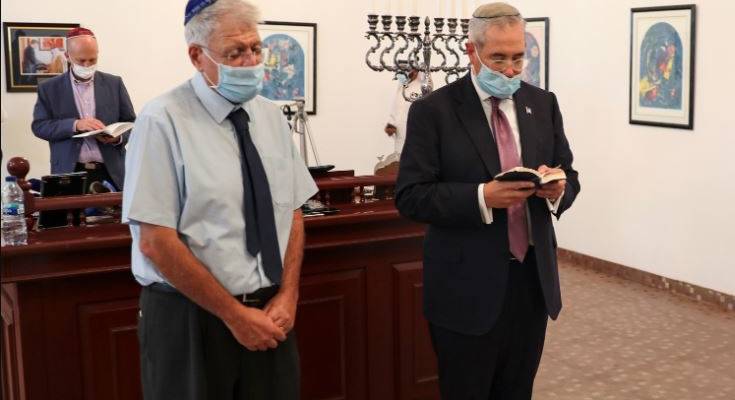Diplomats make time during their historic peace mission to hold daily prayers with tiny Bahraini Jewish community.
By Yakir Benzion, United With Israel
Members of the joint Israeli-US delegation that flew to Bahrain Sunday to negotiate the establishment of diplomatic relations took time out to visit Bahrain’s synagogue for prayers.
The religious members of the delegations prayed the afternoon “mincha” prayers in the capital, Manama, as journalists and other delegation members watched.
“Bahrain, Israel sign historic Joint Communique on the Establishment of Diplomatic, Peaceful and Friendly Relations,” Bahrain’s Foreign Ministry tweeted.
The government even posted a short video of the prayers on some of its social media, including the Twitter account of the Bahrain embassy in London.
The U.S. Committee for the Preservation of America’s Heritage Abroad also tweeted that their representative “had the honor of meeting with Ebrahim Nonoo, leader of the Bahrain Jewish community, and H.E. Houda Nonoo at the synagogue in Manama. A testament to Bahrain that heritage was never lost and is embraced in the Kingdom.”
In an earlier interview with the Saudi Al Arabiya newspaper, Nonoo explained that his family stayed in Bahrain in 1948, when the modern State of Israel was established, after the synagogue in Manama, the only one in the country, was burned down. The majority of Jewish families fled to Israel.
“We are hoping to create a functioning synagogue with a rabbi,” said Nonoo, a businessman who at one point was the first Jewish member of Bahrain’s parliament.
Nonoo said that the new peace agreement “changes everything.” The synagogue is being revived, and he hopes the small community that has only 50 or 60 people can rebuild, especially with the new ties that might see more Jews move to the Gulf.
“I have a strong feeling that the community will grow now that the normalization is in place,” Nonoo said.
Nonoo told Al Arabiya that he and his family could have moved to Israel at any time, but they actively chose to stay in Bahrain, where they are citizens.
“I really do consider myself a Bahraini,” Nonoo said, adding that the Bahraini leadership has always protected the Jewish minority.
“It wasn’t the Bahrainis that took objection to the Jews after 1948. The backlash was mostly from a group of foreign workers in the country,” he said.
“Now the children of the Jews who left for Israel will be able to return and visit the houses where their parents used to live,” Nonoo said. “For me, as a Jew, it will be a very heartening thing to be a guide for Jewish visitors from Israel.”
